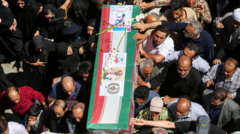An Israeli military strike on Evin Prison in Tehran resulted in the deaths of 71 individuals, as revealed by Iranian state news sources. The incident has reignited discussions surrounding the treatment of political prisoners in Iran.
Israeli Airstrike on Evin Prison Claims 71 Lives, Reports State Media

Israeli Airstrike on Evin Prison Claims 71 Lives, Reports State Media
Major incident raises human rights concerns and scrutiny of Iran's detention practices
On June 29, 2025, Iranian state news reported a devastating Israeli airstrike on the infamous Evin Prison, which resulted in the deaths of at least 71 people. The prison, known for holding political dissidents and activists, has long been a focal point in discussions about human rights abuses in Iran.
Asghar Jahangir, a spokesperson for Iran’s judiciary, disclosed that among those killed were detainees, their visiting relatives, and prison staff. However, the lack of detailed identification has heightened fears for the safety of many inmates. Families of those incarcerated have expressed growing concern as they have been unable to contact their loved ones following the attack on June 23.
Evin Prison is notorious for housing a substantial number of political prisoners, including opposition figures, human rights activists, journalists, and individuals with dual nationalities. Reports from human rights organizations frequently detail allegations of torture, execution, and various forms of abuse against prisoners. Former detainees have recounted harrowing experiences of psychological humiliation and solitary confinement.
In response to the attack, Israeli military officials remained taciturn, with the defense ministry refusing to comment on Jahangir's statements. The Israeli military’s earlier efforts included strikes against several targets connected to Iran, including the Basij organization known for suppressing protests.
This airstrike on Evin Prison is part of a larger conflict where over 600 Iranians reportedly lost their lives during a recent war that concluded with a cease-fire. The prison’s top prosecutor, Ali Ghanaatkar, known for overseeing cases against dissidents, was also reported among the casualties of the Israeli strikes.
The continued violence and instability heighten tensions in the region, sparking an international dialogue about the implications for human rights and the treatment of political prisoners within Iran's justice system. As the global community looks for answers, the fallout from this tragic event continues to unfold.
Asghar Jahangir, a spokesperson for Iran’s judiciary, disclosed that among those killed were detainees, their visiting relatives, and prison staff. However, the lack of detailed identification has heightened fears for the safety of many inmates. Families of those incarcerated have expressed growing concern as they have been unable to contact their loved ones following the attack on June 23.
Evin Prison is notorious for housing a substantial number of political prisoners, including opposition figures, human rights activists, journalists, and individuals with dual nationalities. Reports from human rights organizations frequently detail allegations of torture, execution, and various forms of abuse against prisoners. Former detainees have recounted harrowing experiences of psychological humiliation and solitary confinement.
In response to the attack, Israeli military officials remained taciturn, with the defense ministry refusing to comment on Jahangir's statements. The Israeli military’s earlier efforts included strikes against several targets connected to Iran, including the Basij organization known for suppressing protests.
This airstrike on Evin Prison is part of a larger conflict where over 600 Iranians reportedly lost their lives during a recent war that concluded with a cease-fire. The prison’s top prosecutor, Ali Ghanaatkar, known for overseeing cases against dissidents, was also reported among the casualties of the Israeli strikes.
The continued violence and instability heighten tensions in the region, sparking an international dialogue about the implications for human rights and the treatment of political prisoners within Iran's justice system. As the global community looks for answers, the fallout from this tragic event continues to unfold.






















